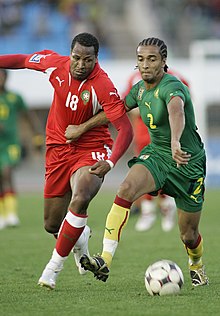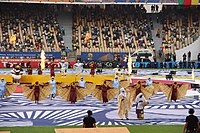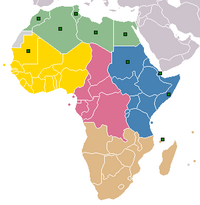Introduction
Football is the most popular sport in Africa. Indeed, football is probably the most popular sport in every African country, although rugby and cricket are also very popular in South Africa. (Full article...)
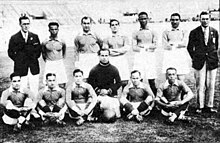
Selected article -
The African Nations Championship, (in French Championnant d'Afrique des Nations) known for sponsorship purposes as the TotalEnergies African Nations Championship and commonly abbreviated as CHAN, is a biennial African association football tournament organized by the Confederation of African Football (CAF) since 2009 and first announced on 11 September 2007. The participating nations must consist of players playing in their national league competitions.
The Democratic Republic of the Congo (DR Congo for short) and Morocco are the most successful teams in this tournament with two titles each, followed by Tunisia, Libya and incumbent champions Senegal with one each. The tournament began life in 2009 with 8 teams, which was doubled for the 2nd edition up until the 6th and is currently contested by 18 teams since the 2022 edition.
Since the 2014 edition, matches of every edition of this tournament from qualification to the final will be computed to calculate the forthcoming FIFA World Rankings following its conclusion, which CAF exclaimed at the time as "an important step for the competition's development". At the time, FIFA considers the tournament "friendly" since it is restricted to players from local leagues to participate. The tournament is held biennially and alternates with the Africa Cup of Nations.
Selected biography -
Ayew began his career in Ghana, playing for Nania, while debuting for the club at age 14. In 2005, he signed with his father's former club, Marseille, and spent two seasons in the club's youth academy before making his debut in the 2007–08 season. Ayew spent the following two seasons on loan with Lorient and Arles-Avignon, helping the latter team earn promotion to Ligue 1 for the first time. In 2010, he returned to Marseille and became an integral part of the first team under manager Didier Deschamps, making over 200 appearances and winning consecutive Trophée des champions and Coupe de la Ligues in both 2010 and 2011.
Ayew has been a full international for Ghana since 2008 and has earned over 65 caps. At youth level, he starred for and captained the under-20 team that won both the 2009 African Youth Championship and the 2009 FIFA U-20 World Cup. He has played in two FIFA World Cups (2010 and 2014), as well as five Africa Cup of Nations (2008, 2010, 2012, 2015 and 2017), helping them finish runner-up in 2010 and 2015 (in which he was also top goalscorer).
Selected image -
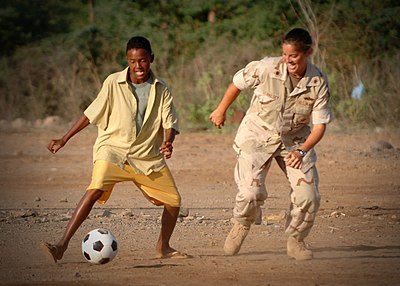 |
A U.S. Navy lieutenant plays football with a Djiboutian boy at an orphanage in Djibouti City. Football in Djibouti is controlled by the Djiboutian Football Federation and the nation has been a member of FIFA since 1994.
Subcategories
Related portals
More sports portals
WikiProjects
Related task forces and sub-projects
African football task force
WikiProject Africa • WikiProject Football
WikiProject Football task forces and sub-projects
Topics
Open tasks

- Expand stubs: Competitions in Africa • Organizations
- Expand club articles of teams from Africa.
- Expand biographies of Africans involved in football.
- Create: Requested articles • Most wanted football articles • Requested general football articles
- Add: Infoboxes • Images (General requests, Requested images of people)
- Review: articles currently under review
- Assess: Assessment requests • Assess an article
- Revert vandalism on this portal and on African football articles
- Assist in maintaining this portal and keeping its selected content up to date.
- WikiNews: Create and submit news stories about African football for Wikipedia's sister project WikiNews.
Associated Wikimedia
The following Wikimedia Foundation sister projects provide more on this subject:
-
 Commons
Commons
Free media repository -
 Wikibooks
Wikibooks
Free textbooks and manuals -
 Wikidata
Wikidata
Free knowledge base -
 Wikinews
Wikinews
Free-content news -
 Wikiquote
Wikiquote
Collection of quotations -
 Wikisource
Wikisource
Free-content library -
 Wikiversity
Wikiversity
Free learning tools -
 Wiktionary
Wiktionary
Dictionary and thesaurus
More portals
Sources

- ^ "The History Of Soccer In Africa". NPR.org. 2010-06-09. Retrieved 2016-03-31.
- ^ a b c Alegi, Peter (2010). African Soccerscapes. Ohio University Press. pp. 1–2. ISBN 9780896802780.
- ^ Frimpong, Enoch Darfah. "Ghana news: A world of superstition, frustration and disillusionment - Graphic Online". Retrieved 23 September 2017.
- ^ Lacey, Marc (8 August 2002). "Kangemi Journal; For Spellbinding Soccer, the Juju Man's on the Ball". The New York Times. NY Times. Retrieved 2016-03-31.
- ^ "World Cup Witchcraft: Africa Teams Turn to Magic for Aid". National Geographic. Archived from the original on July 10, 2006. Retrieved 2016-03-31.
- ^ Andy Mitten (September 2010). The Rough Guide to Cult Football. Rough Guides UK. ISBN 9781405387965. Retrieved 2016-04-02.
- ^ "African Nations Cup overshadowed by hocus pocus | Football". The Guardian. Retrieved 2016-04-09.
- ^ Kuper, Simon (2006). Soccer Against the Enemy: How the World's Most Popular Sport Starts and Stops Wars, Fuels Revolutions, and Keeps Dictators in Power. Nation Books. p. 123. ISBN 978-1-56025-878-0.



